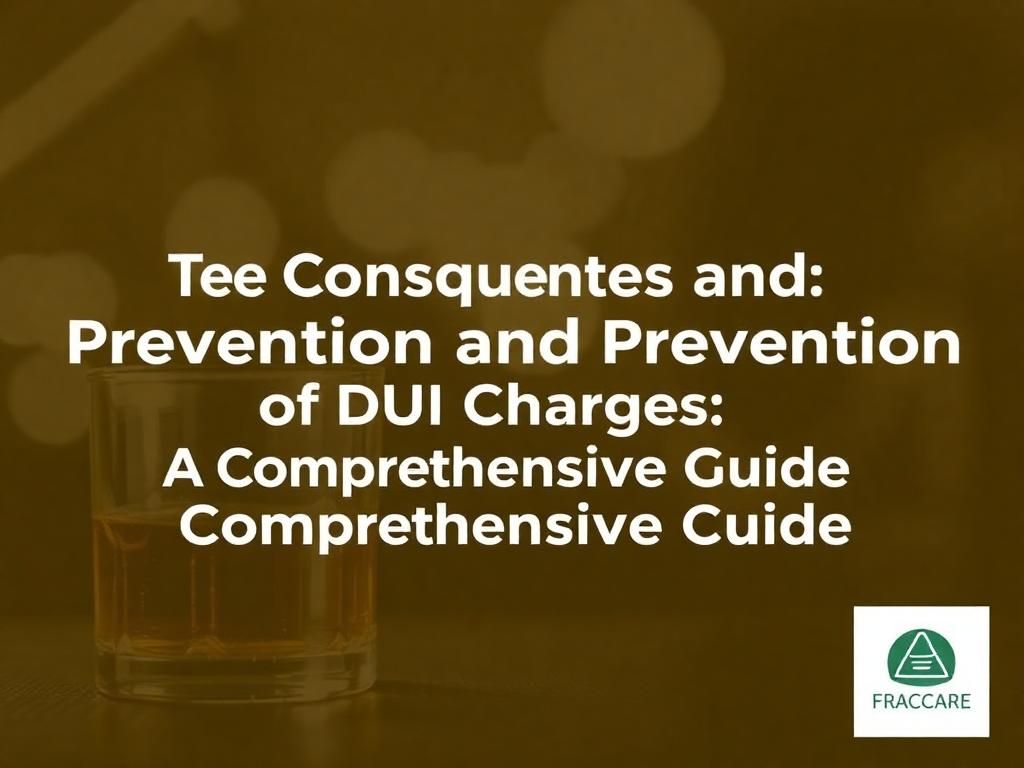Driving Under the Influence, commonly referred to as DUI charges, is a serious offense that can have long-lasting ramifications. Understanding what constitutes a DUI, the common causes, the legal consequences, and effective prevention methods is essential for every driver. With increasing road safety campaigns, awareness of DUI laws is crucial for preventing accidents and legal troubles. This article provides an in-depth look at DUI charges, their implications, and ways to stay informed and safe on the road.
Understanding DUI Charges
Definition of DUI (Driving Under the Influence)
A DUI charge is levied against individuals operating a motor vehicle while impaired by alcohol or drugs. Each state has specific legal limits regarding Blood Alcohol Concentration (BAC), usually set at 0.08% for drivers aged 21 and above. However, even lower levels can result in a DUI charge if a driver demonstrates impaired abilities.
Importance of Understanding DUI Laws
Comprehending DUI laws is vital not only to avoid legal trouble but also to promote safe driving practices. Knowledge of these laws can deter individuals from engaging in risky behaviors and encourage responsible decisions regarding alcohol consumption.
Overview of the Penalties Associated with DUI Charges
DUI charges can lead to severe penalties, including fines, license suspensions, and even imprisonment. Understanding these consequences can foster a culture of responsibility among drivers, ultimately reducing incidences of impaired driving on the roads.
Common Causes of DUI Charges
Alcohol Consumption
Alcohol consumption remains the leading cause of DUI charges. Studies show that approximately 30% of all traffic-related deaths involve alcohol. Various factors influence a person’s BAC levels, such as body weight, gender, and the rate of consumption.
Drug Impairment
In addition to alcohol, drug impairment can lead to DUI charges. This includes:
– Prescription medications
– Illegal substances
Understanding drug influence testing is critical, as methods for detecting impairment can vary greatly. Field tests, urinalysis, and blood tests are commonly employed to assess whether a driver is under the influence.
Other Contributing Factors
It’s essential to recognize that DUI charges are not solely attributed to substances. Factors such as fatigue and medical conditions can significantly impair driving abilities. Sleep deprivation can have similar effects on a driver’s response times as drinking alcohol.
Consequences of DUI Charges
Legal Penalties
DUI charges can result in a myriad of legal penalties. These may include:
– Fines: Ranging from hundreds to thousands of dollars.
– Possible imprisonment: Depending on the severity of the offense, sentences can vary significantly.
– Probation terms: Often imposed as an alternative to serving time.
– Community service requirements: Many jurisdictions require community service as part of sentencing.
Administrative Penalties
In conjunction with legal penalties, administrative consequences include:
– License suspension or revocation: A standard penalty, often lasting several months to years.
– Mandatory DUI education programs: Designed to help offenders understand the risks associated with impaired driving.
Long-term Impact
The fallout from a DUI charge extends beyond legal repercussions. Offenders may face challenges in:
– Employment: Many employers conduct background checks, and a DUI can hinder job opportunities.
– Increased insurance premiums: Rates can skyrocket following a DUI conviction, costing offenders significantly more.
– Personal and social life: Relationships may suffer due to the stigma attached to DUI.
The DUI Arrest Process
Initial Traffic Stop
A DUI arrest typically begins with a traffic stop. Law enforcement may initiate a stop based on observed traffic violations or erratic driving behaviors. Officers look for specific signs of impairment, including swerving, speeding, or delayed reactions.
Field Sobriety Tests
Field sobriety tests are conducted to evaluate a driver’s physical and cognitive abilities. Common tests include:
– Walk-and-Turn
– One-Leg Stand
These tests help law enforcement officers determine whether probable cause exists for further testing.
Breathalyzer and Blood Tests
If a driver is suspected of DUI, they may be required to take a breathalyzer or blood test. Legal implications exist for refusing to take these tests, often resulting in additional penalties. The process for collecting samples includes using standardized methods to ensure accuracy.
Defending Against DUI Charges
Common Defense Strategies
Individuals facing DUI charges might employ various defense strategies, such as:
– Challenging the legality of the traffic stop: If a stop is deemed unlawful, evidence may be excluded.
– Questioning the accuracy of breathalyzer/blood tests: Technical errors can lead to wrongful charges.
– Proving lack of impairment: Demonstrating that the individual was not impaired at the time can negate charges.
Hiring a DUI Attorney
Consideration should be given to hiring a DUI attorney, primarily due to their expertise in navigating legal complexities. Look for attorneys with ample experience in DUI cases, successful track records, and strong communication skills.
DUI Charges Across Different States
Variation in Laws
DUI laws can significantly differ across states. Some states enforce stricter penalties, while others may offer more lenient alternatives. Awareness of your state’s regulations is vital for understanding potential legal repercussions.
Ignition Interlock Devices
Certain states require offenders, especially repeat offenders, to install ignition interlock devices (IIDs). Requirements for installation typically vary, with first-time offenders facing less stringent conditions compared to subsequent offenders.
Prevention and Awareness
Reducing Risk of DUI Charges
To mitigate the risk of DUI charges, consider:
– Designated drivers: Always having a designated driver when consuming alcohol can prevent unsafe driving.
– Use of rideshare services: Opting for services like Uber or Lyft provides a responsible alternative to driving.
Community Programs
Numerous organizations focus on DUI prevention, offering educational initiatives and workshops. Engaging with local programs can increase awareness, promote safe driving practices, and provide resources for individuals struggling with substance use.
| Key Points on DUI Charges | Consequences | Prevention Methods |
|---|---|---|
| Definition of DUI | Fines, imprisonment, probation | Designated drivers |
| Common Causes | License suspension | Rideshare services |
| Legal Penalties | Community service | Community programs |
| Long-term Impact | Employment challenges | Education initiatives |
Frequently Asked Questions (FAQs)
1. What constitutes a DUI charge?
A DUI charge occurs when a driver operates a vehicle while impaired by alcohol or drugs.
2. How can I avoid DUI charges?
Using designated drivers and rideshare services are effective strategies to avoid DUI charges.
3. What are the penalties for a first-time DUI?
Penalties may include fines, license suspension, and mandatory education programs.
4. Can I fight a DUI charge?
Yes, common defense strategies include questioning the legality of the traffic stop and the accuracy of test results.
5. What happens if I refuse a breathalyzer test?
Refusing a breathalyzer test can lead to automatic license suspension and other penalties in many states.
6. How does alcohol consumption affect driving ability?
Alcohol impairs judgment, reaction times, and motor skills, increasing the likelihood of accidents.
7. Are DUI laws the same in every state?
No, DUI laws vary significantly by state, including penalties and requirements for ignition interlock devices.
8. Can I be charged with a DUI for prescription drugs?
Yes, driving under the influence of prescription medications that impair driving can lead to DUI charges.

9. What community resources are available for DUI prevention?
Many local organizations offer educational programs and workshops focused on safe driving and substance use prevention.
10. How long does a DUI stay on my record?
The duration varies by state, but a DUI can remain on your record for several years, typically between 5 to 10 years.


